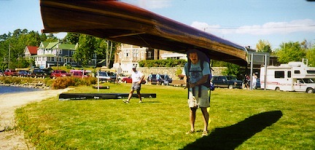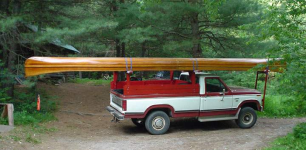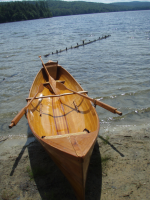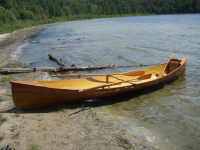I'm looking to build a cedar strip canoe and want to maybe turn it into a small side business. When I look for plans at places like Bear Mountain Boats, I see lots of warnings that say the plans are copy-writed and that it's illegal to sell a canoe built using their plans. Does anyone know how to legally sell a canoe using professional plans purchased from a business?
-
Happy Marine Mammal Rescue Day! 🐳🐬🦭🦦
You are using an out of date browser. It may not display this or other websites correctly.
You should upgrade or use an alternative browser.
You should upgrade or use an alternative browser.
Legal restrictions on selling canoes built from plans?
- Thread starter redsalem
- Start date
- Joined
- Aug 10, 2018
- Messages
- 948
- Reaction score
- 1,066
I would contact Bear Mountain or whoever owns the plans you are hoping to use. They may already have a royalty schedule in place for businesses / individuals who are looking to produce their boats commercially.
Ask the plan supplier directly how much royalty per boat sold.
Or, download Delftship free software, design your own hull, and sell those.
I’ve been strip building since 1978 and selling my boats was once the dream.
Be forewarned, without a substantial reputation, you may not be able to get top dollar, regardless of the quality of your builds.
And, if you need to put food on the table with those boats, it might not be so much fun.
As a sideline, it could be perfect .
Good luck!
Or, download Delftship free software, design your own hull, and sell those.
I’ve been strip building since 1978 and selling my boats was once the dream.
Be forewarned, without a substantial reputation, you may not be able to get top dollar, regardless of the quality of your builds.
And, if you need to put food on the table with those boats, it might not be so much fun.
As a sideline, it could be perfect .
Good luck!
Redsalem, welcome to site membership! Feel free to ask any questions and to post messages, photos and videos in our many forums. Please read Welcome to CanoeTripping and Site Rules! Also, please add your location to your profile, which will cause it to show under your avatar, as this is a geographic sport. We look forward to your participation in our canoe community.
You are asking a legal question that may be governed by Canadian law. Your question can only be professionally answered by an intellectual property lawyer from the country of the law that governs you and your transactions. I say that as an American lawyer who is familiar with U.S. intellectual property law. Out of curiosity, what exactly does the Bear Mountain site say about copyright? I took a quick look and didn't see anything.
Stripperguy makes valid practical points with which I agree from my own experience. Canoes are niche product in a niche that's getting relatively smaller due to kayaks and SUPs. Woodstrip canoes are a small niche within the canoe niche.
You are asking a legal question that may be governed by Canadian law. Your question can only be professionally answered by an intellectual property lawyer from the country of the law that governs you and your transactions. I say that as an American lawyer who is familiar with U.S. intellectual property law. Out of curiosity, what exactly does the Bear Mountain site say about copyright? I took a quick look and didn't see anything.
Stripperguy makes valid practical points with which I agree from my own experience. Canoes are niche product in a niche that's getting relatively smaller due to kayaks and SUPs. Woodstrip canoes are a small niche within the canoe niche.
even without a copyright, in Canada there are still multiple laws governing use of "intellectual property" especially for a commercial venture. As Glenn says you'd need to contact a lawyer to discuss the legal and tax in's and outs, as well as the owners of any plans to see if there is a royalty or franchise opportunity already in place.
I'd hate to see a hobbiest to suffer legal issues just for trying to use their hobby to make a buck, good luck in your endeavour!
I'd hate to see a hobbiest to suffer legal issues just for trying to use their hobby to make a buck, good luck in your endeavour!
Building and selling strip canoes is a good way to go broke. The only people who will pay enough to make it profitable are non-canoeists, looking for a decoration, and that market is quite small.
I have sold several of my canoes, usually to fund a new project, and I usually only get the cost of the materials, sometimes less. There is a non-canoeist up here trying to sell a cedar strip for 5000 bucks. I took one look at it and laughed myself silly. He will be lucky to get 500 bucks. My opinion is that most canoeists who knows their stuff will spend 4 to 5 grand on a high tech canoe that weighs next to nothing, but would probably only give you their lunch money for a stripper.
Wood/canvas canoes are in a different market. I believe there is still some money to be made there, although you would have to carve out a particular niche like Northwest canoes, who built almost all of the freighters in Canada, and recently burned down.
If you were going into full scale commercial production, you might have to worry about copyright. If you are selling one occaisionally, I wouldn't worry about it. One of the designers I deal with has a re-issue fee. The initial cost for the plans is around a hundred bucks. For every hull you build after that, using the same forms, it's around 30 bucks. In that arrangement I would have no problem selling the finished product.
I have sold several of my canoes, usually to fund a new project, and I usually only get the cost of the materials, sometimes less. There is a non-canoeist up here trying to sell a cedar strip for 5000 bucks. I took one look at it and laughed myself silly. He will be lucky to get 500 bucks. My opinion is that most canoeists who knows their stuff will spend 4 to 5 grand on a high tech canoe that weighs next to nothing, but would probably only give you their lunch money for a stripper.
Wood/canvas canoes are in a different market. I believe there is still some money to be made there, although you would have to carve out a particular niche like Northwest canoes, who built almost all of the freighters in Canada, and recently burned down.
If you were going into full scale commercial production, you might have to worry about copyright. If you are selling one occaisionally, I wouldn't worry about it. One of the designers I deal with has a re-issue fee. The initial cost for the plans is around a hundred bucks. For every hull you build after that, using the same forms, it's around 30 bucks. In that arrangement I would have no problem selling the finished product.
- Joined
- Aug 10, 2018
- Messages
- 948
- Reaction score
- 1,066
Agreed. With a policy such as that, I would think you may build until the forms wear out. (if you're really trying to stretch profitability, you might even go stapleless so they last longer).One of the designers I deal with has a re-issue fee. The initial cost for the plans is around a hundred bucks. For every hull you build after that, using the same forms, it's around 30 bucks. In that arrangement I would have no problem selling the finished product.
Mem is right most boat plans of any size are sold with permission to build one boat. If you wish to build more than one there is usually a much smaller fee pre boat after that. I do sell plans and from my end it is really hard to track as I don’t have a good way to follow up. I made a different deal with a very talented builder that was teaching at the WoodenBoat school using my plans. Instead of paying me a new boat fee he instead told his class where they could buy their own set of plans. He didn’t require they purchase but each class was good for three or four plan sales.
A lot of work and knowledge goes into producing a set of plans and one plan sale pays for only a small portion of that time. I really need to raise my prices but as an example I might spend as much time to produce a set of plans as it does to build the actual boat. All of the plans I sell are boats I measured and tried to document. Some I’ve never sold a set, so you never know.
Jim
A lot of work and knowledge goes into producing a set of plans and one plan sale pays for only a small portion of that time. I really need to raise my prices but as an example I might spend as much time to produce a set of plans as it does to build the actual boat. All of the plans I sell are boats I measured and tried to document. Some I’ve never sold a set, so you never know.
Jim
A good friend of mine, who hails from Lowville NY, on the western side of the Adirondacks, began building cedar strip canoes when he was a youngster in high school in the late 1960s. I believe they are based on a modified Rushton design. Since then he has made a life-long living almost exclusively from his boat building business, along with working occasional odd carpentry jobs. Pat has shipped canoes all over the country, and even one or two have gone overseas. He and others (including myself) have paddled and won races in his boats, including C2 tandems, voyageurs, and guideboats, in the Adirondack 90 miler race and other events. So, although he lives simply in a home built (rescued) log cabin, it can be done. It has been a few years, but each of my boats ahown below were priced in the $1200-$1500 range ($2k for the voyageur).










I too started dream of buildings canoes with a cedar strip back in 1975. I soon found I needed more income and was spending more time on the boats than I was able to get paid for. Not to give up I started working in different boat yard doing woodwork on big boats till I finally started my own business, but still doing the big boat work. Now finally getting back to the canoes I love and started with.
Jim
Jim
The book Bear mountain puts out about building canoes says that their plans are protected. However I was able to reach out to them and discovered that the royalty fee is only $40. Very reasonable.Redsalem, welcome to site membership! Feel free to ask any questions and to post messages, photos and videos in our many forums. Please read Welcome to CanoeTripping and Site Rules! Also, please add your location to your profile, which will cause it to show under your avatar, as this is a geographic sport. We look forward to your participation in our canoe community.
You are asking a legal question that may be governed by Canadian law. Your question can only be professionally answered by an intellectual property lawyer from the country of the law that governs you and your transactions. I say that as an American lawyer who is familiar with U.S. intellectual property law. Out of curiosity, what exactly does the Bear Mountain site say about copyright? I took a quick look and didn't see anything.
Stripperguy makes valid practical points with which I agree from my own experience. Canoes are niche product in a niche that's getting relatively smaller due to kayaks and SUPs. Woodstrip canoes are a small niche within the canoe niche.
Those look great! The one on the truck looks to be about 20' long. Wouldn't have room in my shop to build one that big lol. Nice work!A good friend of mine, who hails from Lowville NY, on the western side of the Adirondacks, began building cedar strip canoes when he was a youngster in high school in the late 1960s. I believe they are based on a modified Rushton design. Since then he has made a life-long living almost exclusively from his boat building business, along with working occasional odd carpentry jobs. Pat has shipped canoes all over the country, and even one or two have gone overseas. He and others (including myself) have paddled and won races in his boats, including C2 tandems, voyageurs, and guideboats, in the Adirondack 90 miler race and other events. So, although he lives simply in a home built (rescued) log cabin, it can be done. It has been a few years, but each of my boats ahown below were priced in the $1200-$1500 range ($2k for the voyageur).
View attachment 136289
View attachment 136290
View attachment 136291
View attachment 136292
View attachment 136293
Try 32 feet long. an Adirondack 90 miler multi-year winner! The photo of me carrying it on a Knupac backpack is a promo image for knupac Portage Systems (unfortunately no longer avaialble).Those look great! The one on the truck looks to be about 20' long. Wouldn't have room in my shop to build one that big lol. Nice work!
The book Bear mountain puts out about building canoes says that their plans are protected. However I was able to reach out to them and discovered that the royalty fee is only $40.
I'm professionally curious as to what the $40 applies to. Since you have not yet added your location to your profile, I'm not sure what country you are in. So, my remaining comments apply only to U.S. law.
To be clear, I am not in this or any thread on this site ever giving legal advice in the attorney-client sense to any individual, but only discussing general legal principles as I might in a publication or lecture.
Paper and digital plans can be copyrighted. This means you can't buy plans and then start making copies of those plans and selling the plans to other people. This is because the creator of the plans remains the copyright owner, and hence is the only one permitted to make copies of the plans.
However, that has nothing to do with making boat hulls from the plans and selling the boats. The boat hulls themselves cannot be copyrighted. The only available legal protection for a boat hull in the U.S. is the 1998 Vessel Hull Design Protection Act, which currently protects probably no canoes. See my more extended explanation in THIS thread. Again, I know nothing about Canadian law.
I see a FAQ on the Bear Mountain site that says this:
"For those wishing to use a CNC router, we can provide .dxf format digital plans. The charge is $210 for the files, plus an additional $40 royalty for each set cut after the after first. Please contact us . . . for purchasing details."
I'm not familiar with CNC routers, digital plans or the technicalities of boat building, but I'd want to know whether this $40 purportedly applies: (1) only to cutting additional sets of mold forms from the digital plans, or (2) also to the boats that are produced from one cut set of mold forms and later sold.
The $40 would be for additional boats only. But I guess if you were cutting out station molds and selling them it would apply to them also as they would enable someone to build another boat.
Jim
Jim
The $40 would be for additional boats only. But I guess if you were cutting out station molds and selling them it would apply to them also as they would enable someone to build another boat.
I don't know what's in Bear Mountain's contracts, but I read this FAQ as applying only to cutting sets of station molds. Help me with facts. If you get digital CNC plans for a Lusitania canoe, do you have to cut more than one set of station molds to make several Lusitanias?
No but every boat after the first one that you build would be a $40 fee to the designer. That fee might be different depending on the designer.
Jim
Jim
- Joined
- Aug 10, 2018
- Messages
- 948
- Reaction score
- 1,066
When I bought the plans for the 1st 3 builds, I seem to recall that at least one of them said that purchasing the plans gave me the right to build one canoe and that additional canoes could be built by paying a (smaller) fee per boat. Seems very reasonable and, in any commercial operation, I would think you'd treat it as a cost of production and pass it on to the consumer.
No but every boat after the first one that you build would be a $40 fee to the designer.
Well, that's precisely what I think is an open question as to Bear Mountain unless one examines the exact wording of their contract. The FAQ doesn't seem to say that. And the legal enforceability of any such contract may depend on what country, state or province the customer lives in.
I am also unaware whether it is common for sellers of boat plans to try to restrict how many boats can be made from the plans. I've looked at a few plan sites now and don't see the issue directly addressed. Such a restriction would have to be clearly stated in the contract or terms and conditions under which the plans are sold, and the buyer would have to agree. Even then, such a restriction would not necessarily be legally enforceable in all jurisdictions. And even if legally enforceable, it wouldn't seem to be practically enforceable for a variety of reasons.
- Joined
- Aug 10, 2018
- Messages
- 948
- Reaction score
- 1,066
Legal fine print aside, it seems that adding a royalty to the cost of the boat (or drawing up your own plans) is simply the right thing to do. Whichever of the 3 I eventually build out of sumac will be paid.
Similar threads
- Replies
- 7
- Views
- 694
- Replies
- 12
- Views
- 966
- Replies
- 5
- Views
- 541
